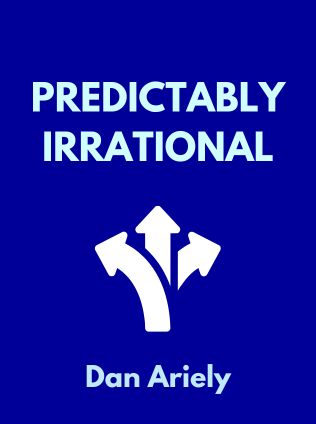
Predictably Irrational
The Hidden Forces That Shape Our Decisions
By Dan Ariely
Published 04/2010
About the Author
Dan Ariely, the James B. Duke Professor of Psychology and Behavioral Economics at Duke University, is a renowned author and researcher. With appointments at the Fuqua School of Business, the Center for Cognitive Neuroscience, the School of Medicine, and the Department of Economics, Ariely is a leading voice in understanding human behavior. He founded the Center for Advanced Hindsight, where his research focuses on how we make decisions and the hidden forces that influence them. His work spans across several disciplines, offering a deep dive into the intricacies of human nature.
Main Idea
"Predictably Irrational: The Hidden Forces That Shape Our Decisions" delves into the often-surprising ways our decisions are influenced by irrational forces. Ariely argues that our irrational behaviors are systematic and predictable, affecting our choices in everyday life. From spending habits to decision-making processes, the book explores how emotions, social norms, and other invisible factors lead us astray. The main thrust is to highlight these patterns and provide insights into making better, more informed decisions.
Table of Contents
- The Truth About Relativity
- The Fallacy of Supply and Demand
- The Cost of Zero Cost
- The Cost of Social Norms
- The Influence of Arousal
- The Problem of Procrastination and Self-Control
- The High Price of Ownership
- Keeping Doors Open
- The Effect of Expectations
- The Power of Price
- The Context of Our Character
- Beer and Free Lunches
The Truth About Relativity
Ariely introduces the concept of relativity by examining how we perceive value. He explains that humans tend to compare options relative to one another rather than assessing them in isolation. This relativity affects our decisions significantly. For instance, consider a scenario where you are deciding between buying a pen for $25 or traveling 15 minutes to buy it for $18. Most people would make the trip to save $7. However, if the same $7 saving was offered on a $450 suit, fewer people would make the trip. The value of money is relative to the context.
"We look at our decisions in a relative way and compare them locally to the available alternative." - Dan Ariely
This principle is illustrated through the experiments of Amos Tversky and Daniel Kahneman, who demonstrated that people's willingness to pay varies based on context. To combat this relativity, Ariely suggests thinking more broadly about our decisions, which can lead to better financial management and overall decision-making.
The Fallacy of Supply and Demand
Traditional economics assumes that supply and demand are independent forces that together determine market prices. Ariely challenges this notion, arguing that consumer preferences and willingness to pay are highly influenced by external factors such as marketing and price anchoring. For instance, the Manufacturer's Suggested Retail Price (MSRP) can anchor our perception of value and influence what we are willing to pay.
Sign up for FREE and get access to 1,400+ books summaries.
You May Also Like
The Subtle Art of Not Giving a F*ck
A Counterintuitive Approach to Living a Good Life
By Mark MansonRich Dad Poor Dad
What the Rich Teach Their Kids About Money - That the Poor and Middle Class Do Not!
By Robert T. KiyosakiHow To Win Friends and Influence People
The All-Time Classic Manual Of People Skills
By Dale CarnegieFreakonomics
A Rogue Economist Explores the Hidden Side of Everything
By Steven D. Levitt and Stephen J. Dubner



















